Table of Contents
Many brands struggle with getting enough user-generated content (UGC). The most common objections are: “We don’t have enough customers creating content,” “It’s hard to keep the flow going,” or “It’s inconsistent.”
The reality is that UGC can be systematically encouraged, collected and leveraged with the correct strategy. It’s not a matter of if, but how. Every company, regardless of size or industry, has customers ready to share their experiences.
The key is creating the right environment and systems to encourage and capture this content. Let’s explore how you can activate your community by informing, inspiring and incentivising them.
A steady stream of user-generated content is essential for modern brands. Let’s explore three key benefits that make UGC an invaluable asset for your marketing strategy:
When customers see real people using and endorsing your products, it creates an authentic connection that branded content cannot match. This genuine connection builds trust and encourages others to engage with your brand on a deeper level.
Studies show that 93% of marketers who leverage UGC content in their strategy claim it performs notably better than traditional branded content. UGC helps to humanise your brand by showcasing the diverse experiences and real perspectives of your customer base.
By leveraging UGC, brands can significantly reduce their dependency on expensive professional content creation. This not only saves resources but often results in more reliable and authentic marketing content.
The return on this investment becomes much more compelling when you factor in the continuous nature of UGC. While professional content requires regular investment to stay fresh and relevant, a well-structured UGC initiative can generate a steady stream of content at a fraction of the cost.
User-generated content provides a constant stream of fresh, relevant content that search engines and social media algorithms love. This constant content creation helps to improve your website’s visibility and keeps your users engaged for more time, making your brand relevant in search results. Here’s how:
Additionally, UGC often contains natural language that can help your content rank for a broader range of search queries. This organic approach to SEO will complement your existing optimisation efforts, all while providing valuable content for your audience.
Do you think your brand is too small for UGC? Learn how UGC drives growth for small community brands with real examples from Flowbox’s customers.
For brands starting their UGC journey, one of the biggest challenges is building momentum when your community feels small or not yet engaged.
The good news is that size doesn’t always matter at the beginning—what matters is the community activation. Even a handful of loyal customers can become powerful advocates if you know how to guide and motivate them.
Activating your community comes down to three key steps: inform, inspire, and incentivise.
The first step to getting your community involved in creating UGC is communication. Too often, brands assume customers automatically know they should tag them on Instagram or use a campaign hashtag. In reality, people need clear instructions.
Clarity reduces friction. The easier it is for your customers to understand what you’re asking, the more likely they are to act.
Let’s explore some informing strategies from leading brands to activate their community:
Your Instagram bio is one of the simplest ways to invite your customers to create and share UGC. Add a clear call-to-action or branded hashtag to encourage customers to share content that your brand can collect and repurpose. Check how Misako, IKEA Switzerland, and Meller are doing it.
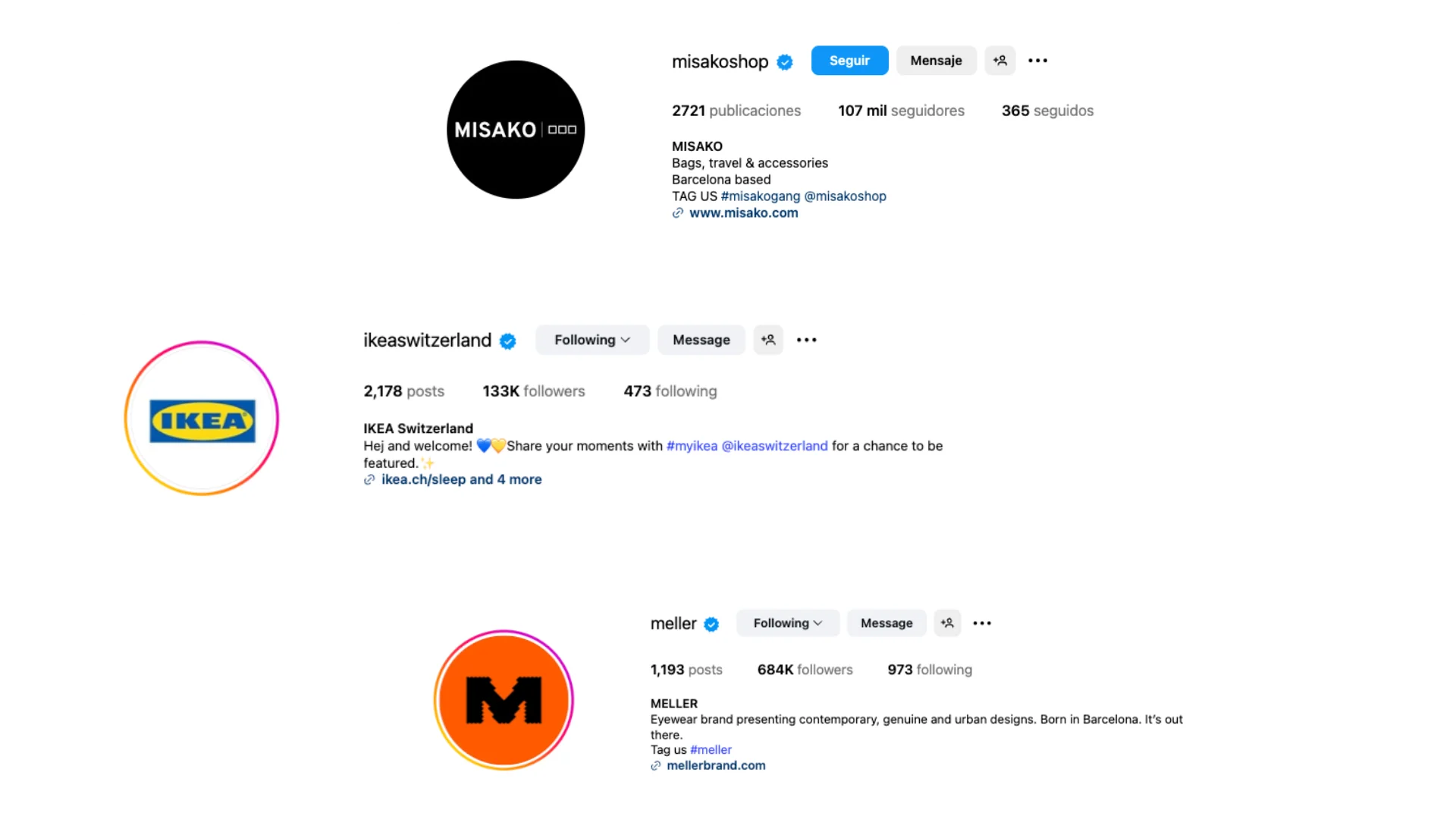
Flowbox enables you to collect content shared by users with the brand tags, mentions and hashtags, as well as other campaign-specific hashtags.
Sometimes it takes a clear announcement to kickstart engagement. Franklin uses dedicated social posts to launch UGC campaigns and explain how followers can take part. These posts work as campaign openers by setting expectations, clarifying hashtags, and giving the community a direct reason to contribute.
Adding UGC to newsletters makes them feel more personal and relatable. Instead of polished product shots, subscribers see real customers using the products in everyday life.
Dressmann uses this approach to highlight authentic experiences alongside their updates, creating emails that hold attention and encourage readers to engage with the content.
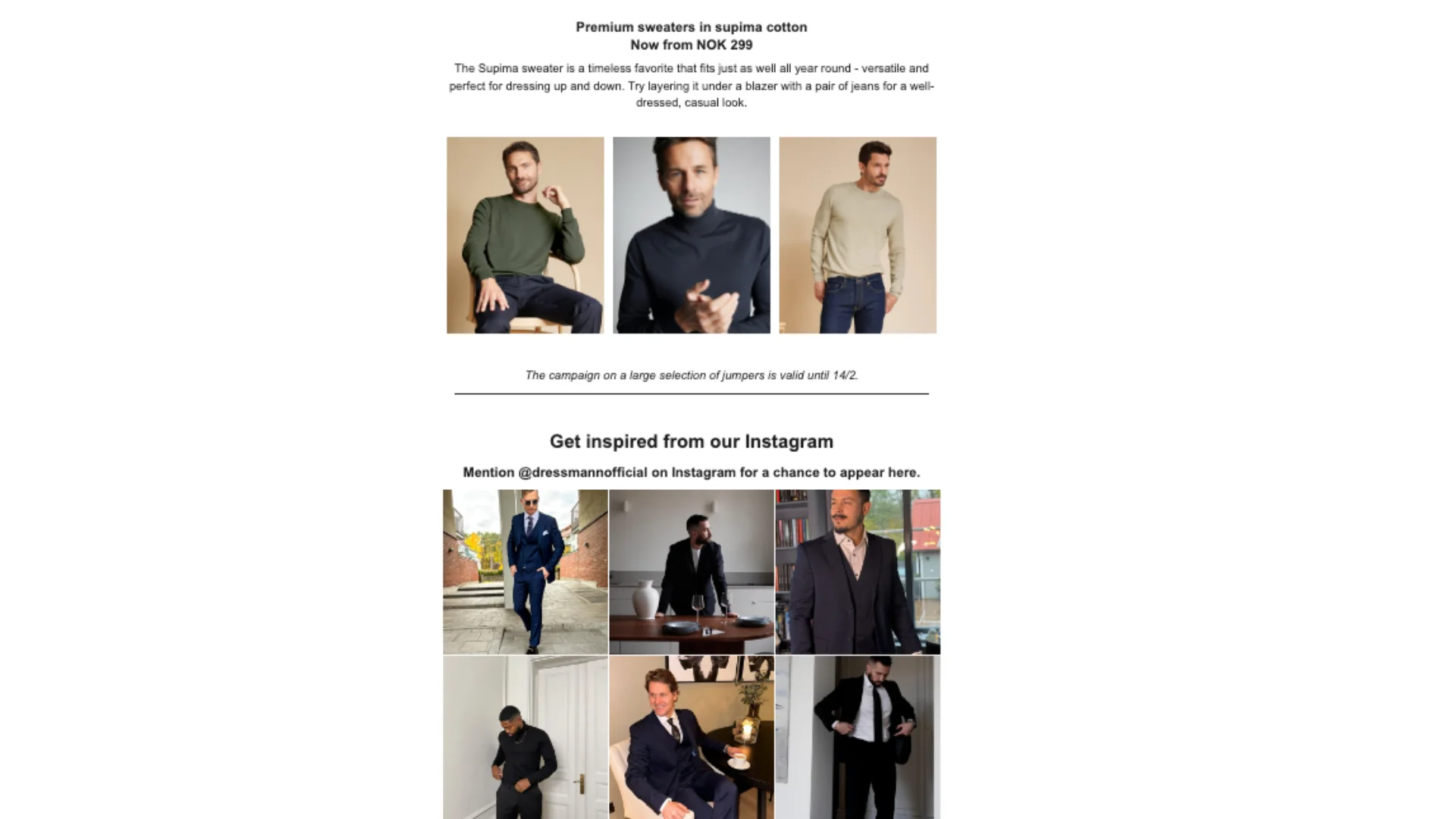
Prénatal includes a UGC gallery at the bottom of their newsletters. When subscribers see real customer experiences, they spend more time reading emails and interacting with the content.

Flowbox email assets allow you to easily integrate UGC galleries on email campaigns to build trust and encourage your community to share content featuring your products.
Not everyone is active on social media, so it helps to offer another way to share. Flowbox’s media uploader feature allows users to submit content without leaving the website, no social media required, which broadens participation and makes contributing feel effortless.
Martinelli Luce implemented a media uploader button directly on their website to encourage direct submissions from their users.
As shown by Miliboo, the key is to make these CTAs feel like a natural extension of the customer experience rather than forced marketing requests.

Flowbox’s media uploader button enables your customers to share their content directly through submissions, eliminating the need to post it on social media. The Media Uploader can be integrated on the website, or even offline with QR codes.
UGC doesn’t always start online. Lakmé shows how offline prompts can drive digital participation by adding QR codes directly to their packaging. Creating a simple link between the offline experience and the online community.
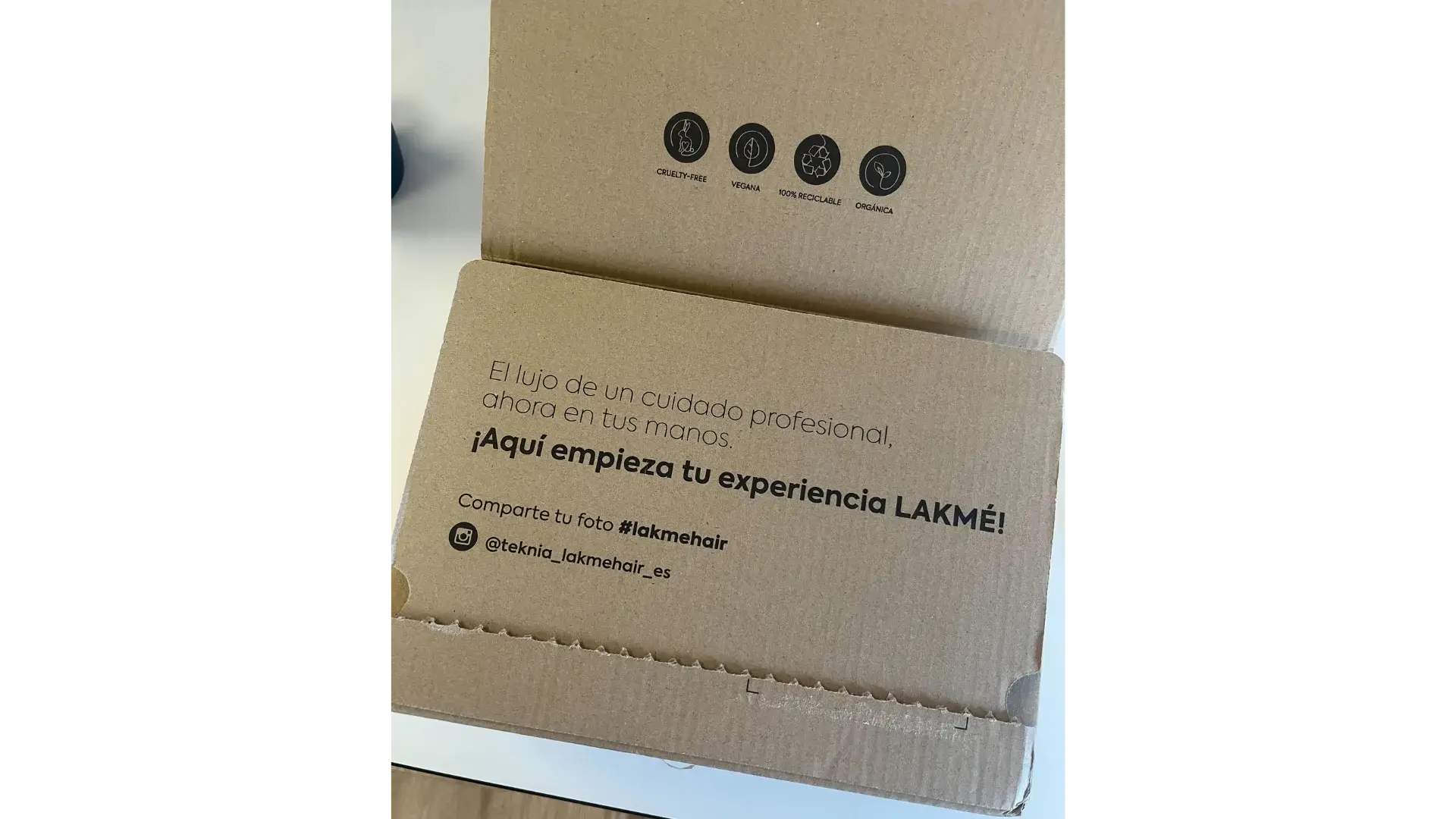
Some people want to join in but aren’t sure how. CREATE helps solve this by integrating UGC guidance into their web pages, showing customers how to share their looks with confidence. By offering clear direction at the point of purchase, they turn inspiration into action.
Information alone isn’t enough; you also need to motivate your community. That’s where inspiration comes in. People want to feel like they’re part of something bigger and meaningful.
By inspiring your community, you transform the simple act of uploading a photo into an opportunity to express themselves and join a collective story.
Let’s explore some inspiring strategies from leading brands to activate their community:
Stories are a quick, playful way to share UGC in a more casual format. Brands like Kwantum use Instagram Stories to keep content fresh and interactive. Because Stories are temporary, they feel low-pressure, which makes more people willing to get involved.
Reposting UGC is one of the easiest ways to build trust and show appreciation. When brands like Marttiini and Guggenheim Bilbao share customer content on their feeds, it not only rewards the contributor but also signals to others that their voices matter.
This recognition creates a feedback loop: being featured motivates more people to share, which keeps the flow of authentic content growing.
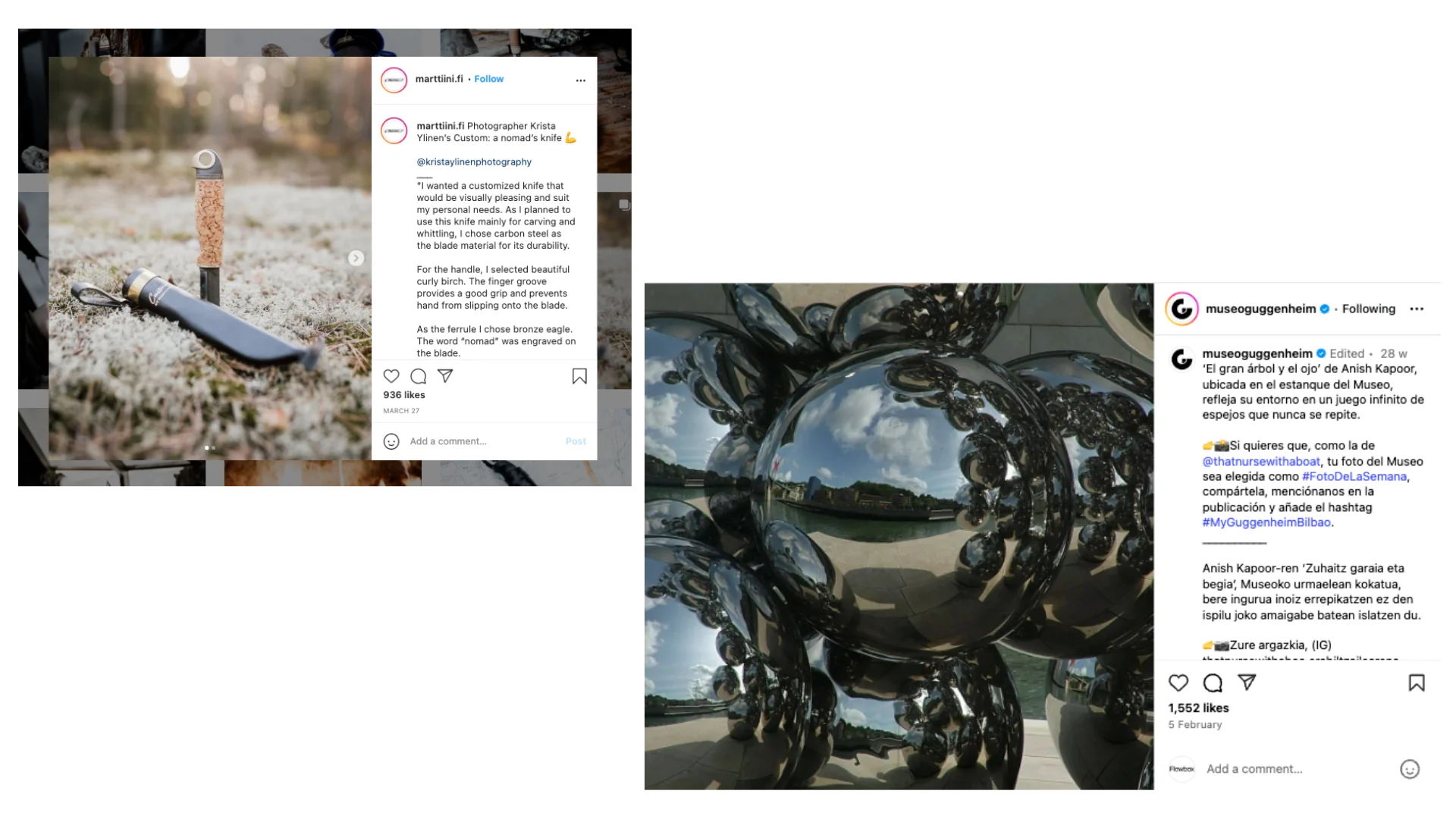
Community galleries are where UGC really comes to life. Onitsuka Tiger uses this format to host a gallery of authentic customer content. Showcasing lifestyle content that inspires visitors and encourages more people to join in.
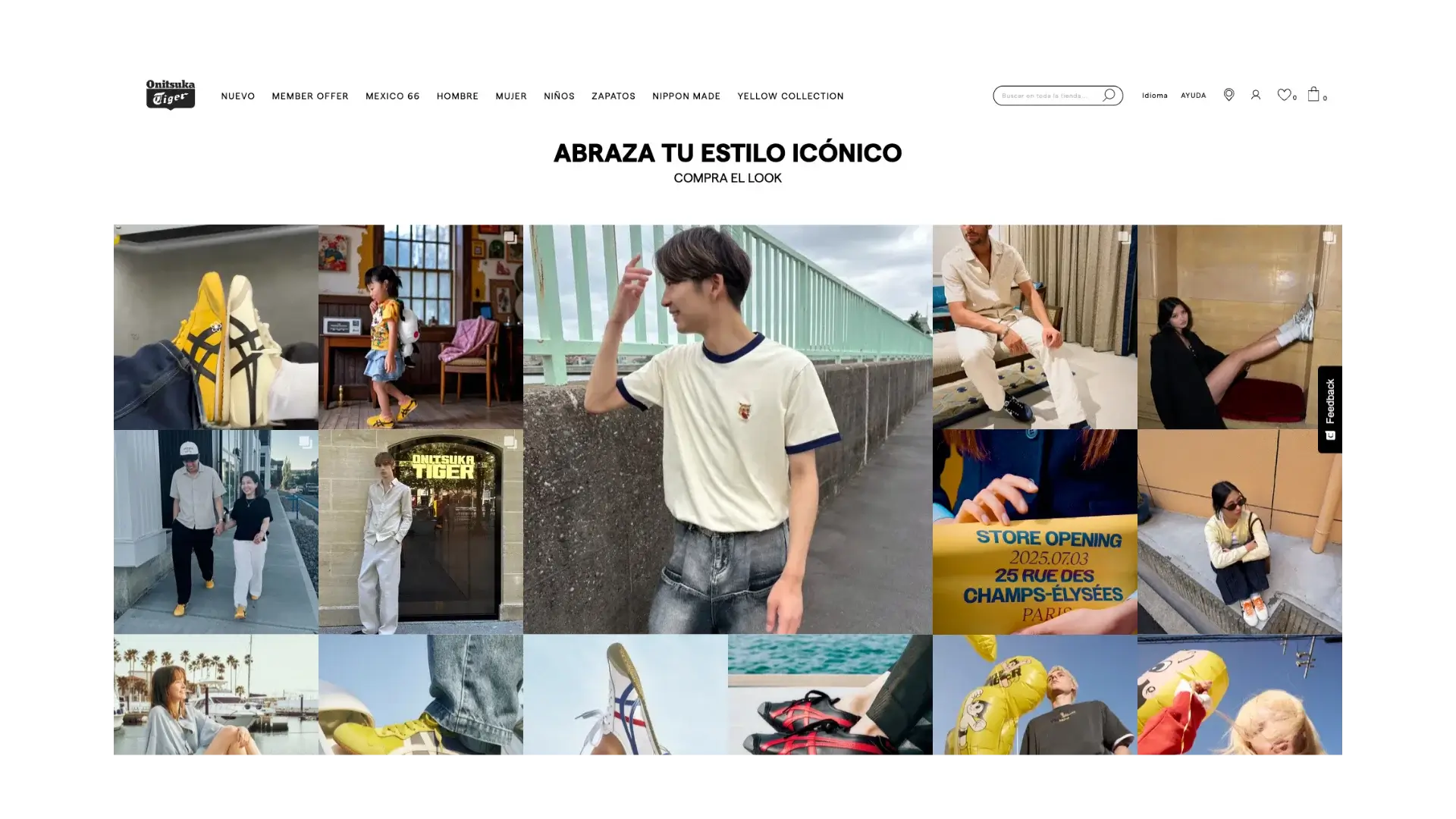
Clear instructions make participation easier. Decathlon sets expectations through a dedicated UGC guidelines page, explaining how customers can share and what kind of content the brand is looking for.
This transparency encourages contributions that align with the brand while giving customers confidence that their content is valued.
Being transparent about how content will be used builds trust. Sophie and Lucie take an original approach by using a terms and conditions page to engage customers directly.
They outline what contributors can expect in return for sharing, turning what’s usually fine print into another touchpoint for community building.
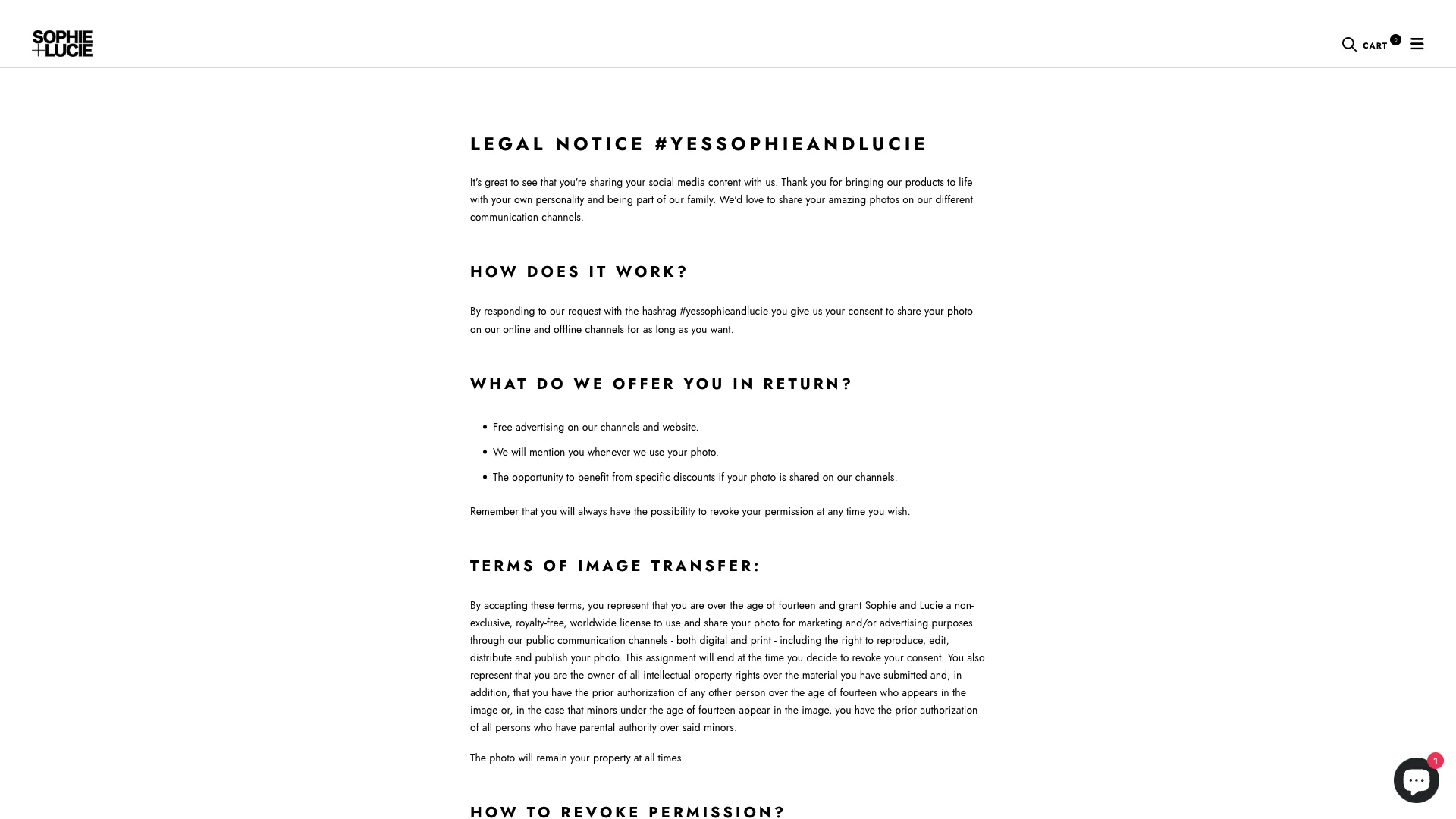
Finally, to sustain momentum, you need to reward participation. Incentives don’t always have to be monetary—recognition can be just as powerful.
Incentives encourage your community to keep engaging, while also showing that you truly value their effort and creativity.
Let’s explore some incentivising strategies from leading brands to activate their community:
Competitions give people a reason to share beyond the product itself. Photo-of-the-month contests or seasonal challenges turn UGC into an event that customers look forward to.
Brands like Muumimaailma run recurring competitions, sometimes offering gift cards as rewards, which not only spark creativity but also keep participation consistent over time.
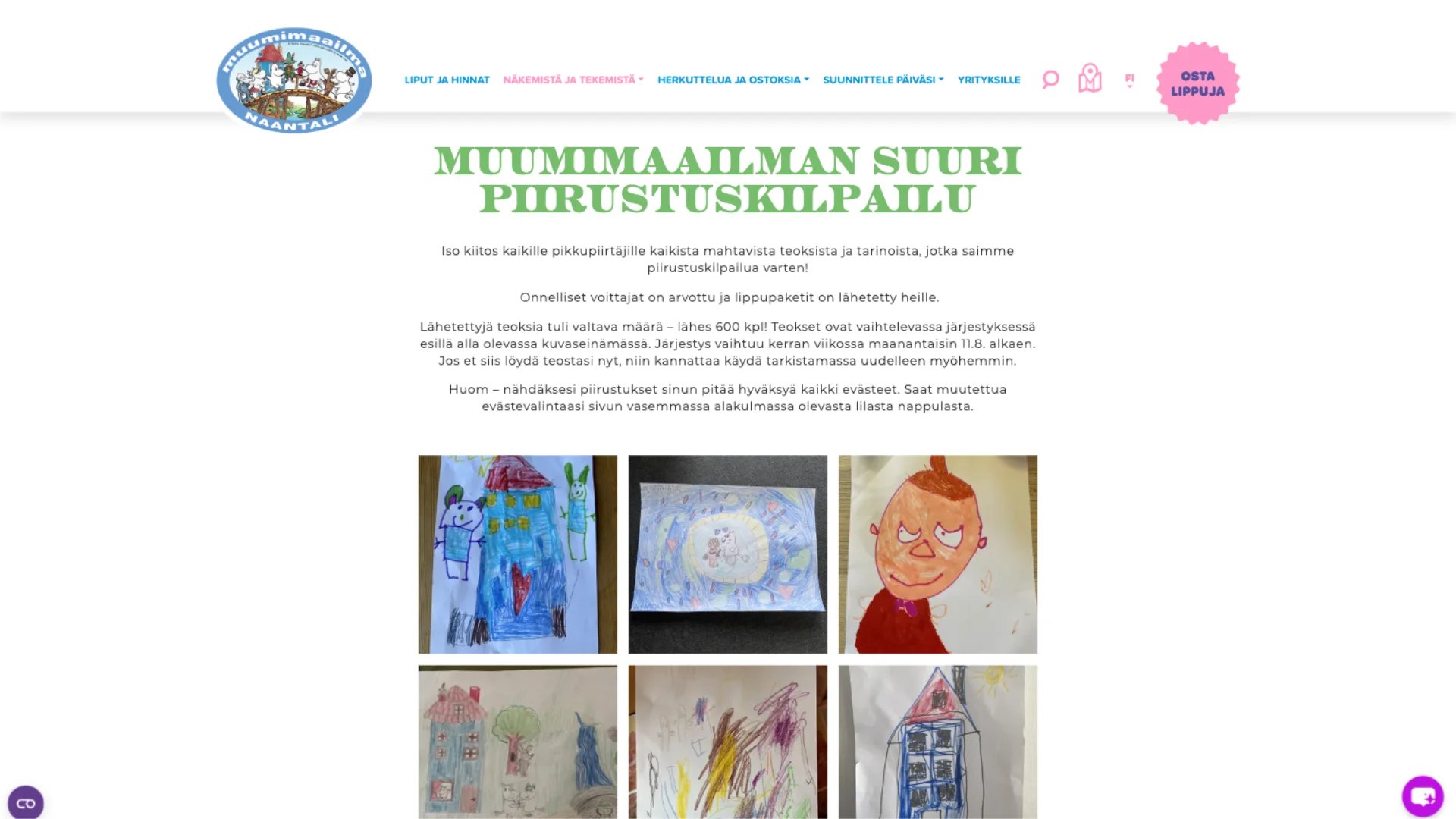
Gudrun Sjödén runs gift card contests to encourage regular submissions, creating a sense of value exchange that benefits both the brand and the community. Rewards like these keep people motivated while still leaving the focus on authentic content.
The moment after someone makes a purchase is often when excitement is at its highest. Inviting customers to share a photo or story in a follow-up email captures that enthusiasm and turns it into content.
Misako shows how effective this can be by combining a call-to-share with a small discount incentive, which both rewards the customer and keeps their community active.
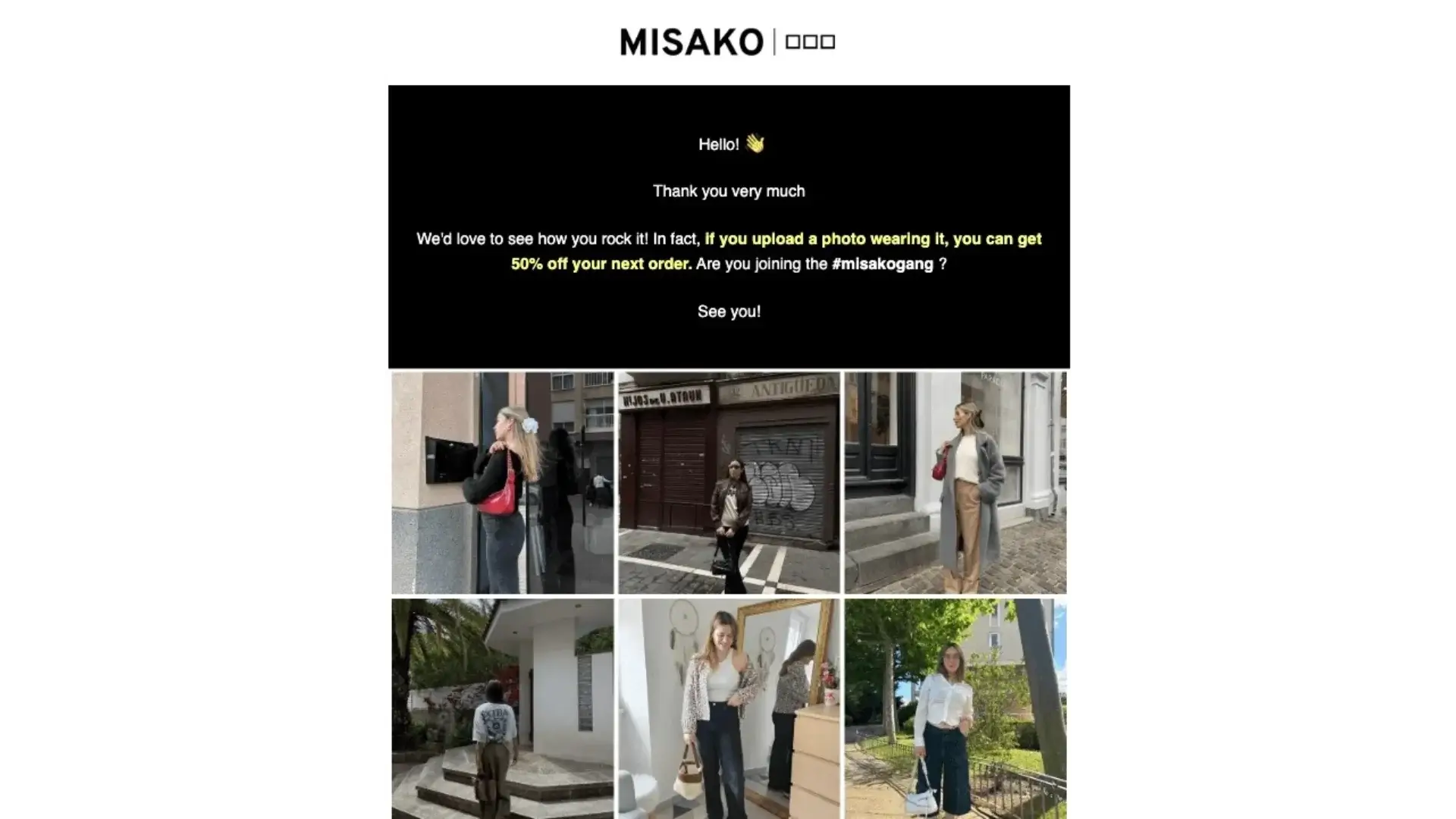
Community-focused emails are about celebrating the people behind the content. Highlighting real stories motivates others to participate and fosters a stronger sense of connection.
Wooden Amsterdam uses this format to spotlight contributors and invite further sharing, turning a regular brand message into something that makes customers feel recognised.
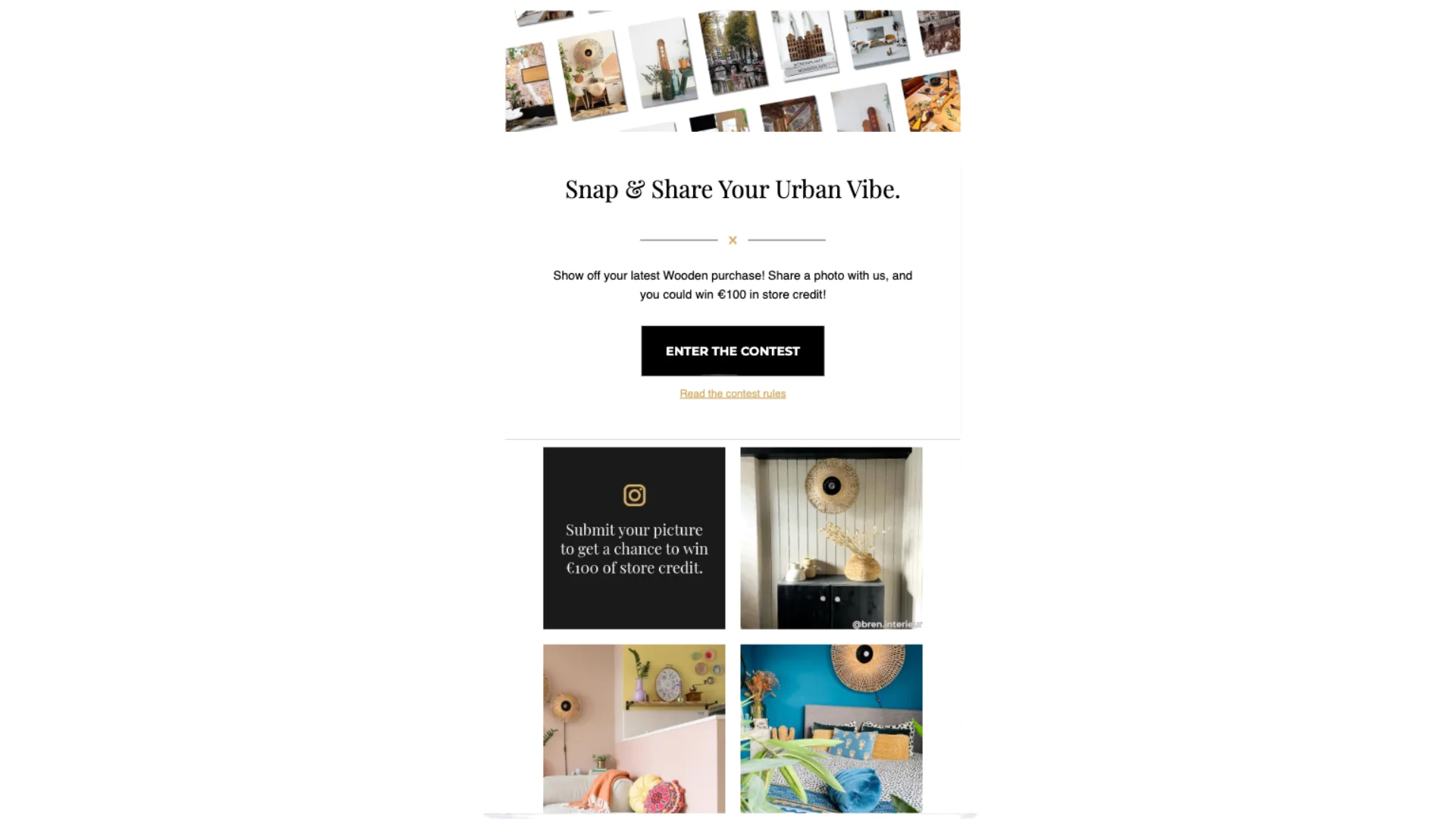
Redskins have launched a loyalty program that allows them to earn points by creating content with the goal of transforming customers into true brand ambassadors.
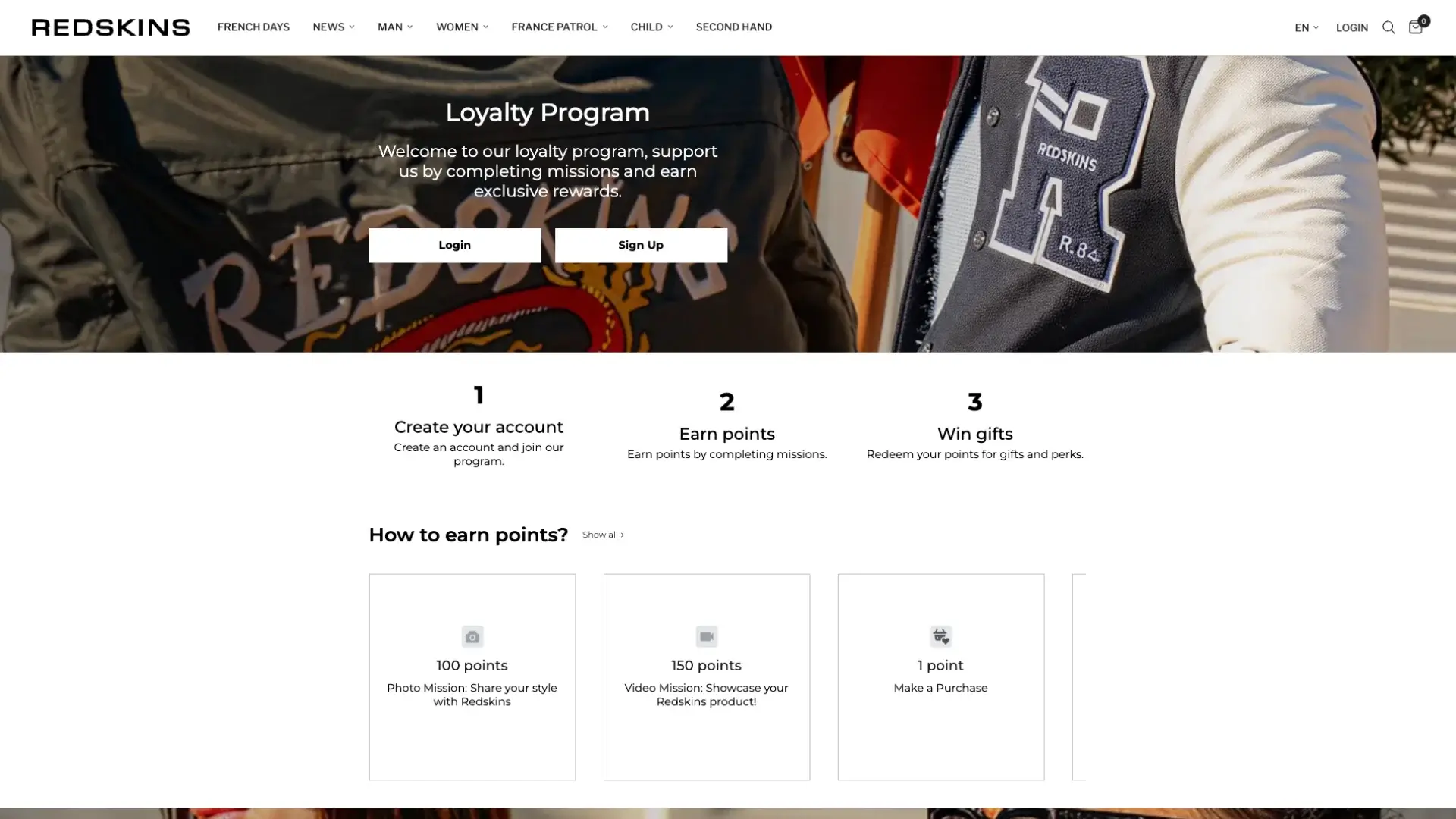
Many brands hesitate to invest in UGC strategies because they fear they don’t have enough customers to generate sufficient content. However, success in UGC isn’t about quantity; it’s about building an engaged community that consistently produces high-quality content. When you nurture relationships with customers, the content naturally follows.
A dedicated UGC platform like Flowbox can significantly enhance your user-generated content management. Flowbox provides powerful tools to collect, manage and display UGC across multiple channels.
Managing content rights can be complex, but Flowbox assists you in requesting and managing rights for Instagram posts. We ensure easy management of your pending requests and help you automatically moderate posts once their rights have been granted.
This ensures that all the quality UGC that you receive is properly authorised for use in your marketing campaigns.
With Flowbox, you can easily integrate UGC into your website and social media channels. With Flowbox’s collection tools, UGC can be automatically gathered from multiple sources and then organised in a central hub.
Thus making it easier for your brand to showcase this content on your media platforms through shoppable galleries, social media feeds and interactive displays, ensuring that your customer content reaches its maximum potential. There are many great shoppable content examples integrated through Flowbox.
Creating a sustainable UGC content flow isn’t about implementing a single strategy; it’s about building an environment that encourages, rewards, and facilitates organic content creation from your customers.
By focusing on making content creation easy, meaningful and enjoyable for your customers, you can build a self-sustaining system that constantly generates valuable content. Along with a platform like Flowbox to simplify the entire process, it’s a recipe for success. Book a demo with Flowbox today.
Successful UGC encouragement requires a multi-faceted approach combining clear incentives, easy-to-use creation tools, prominent content featuring, and engaging social media campaigns. The key is making content creation feel natural and rewarding for your customers.
Quality always trumps quantity in UGC. Focus on building strong relationships with your existing customers and making their content creation experience exceptional. Even a small group of engaged customers can generate impactful content that resonates with your target audience.
The most effective UGC campaigns combine three key elements: engaging community activities, simple participation methods, and meaningful rewards. Success comes from making content creation feel like a natural part of the customer experience rather than a marketing task.
Long-term UGC success comes from making content creation a natural part of the customer experience. This involves regular engagement with contributors, ongoing challenges and campaigns, and consistent recognition of your community’s contributions.
Small brands often have an advantage in UGC creation because they can build more personal relationships with their customers. By focusing on community building and authentic engagement, small brands can create powerful UGC campaigns that rival larger competitors.